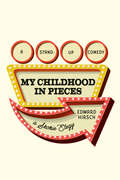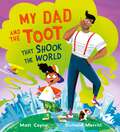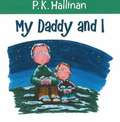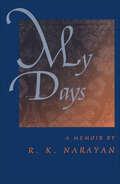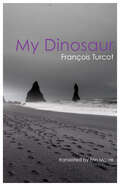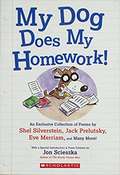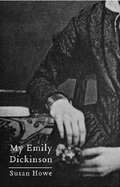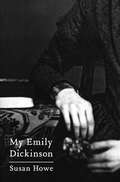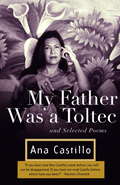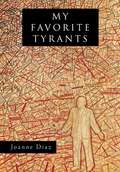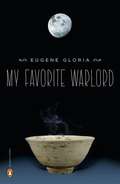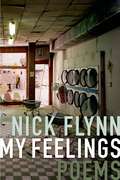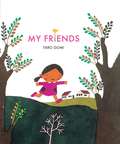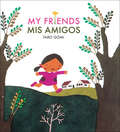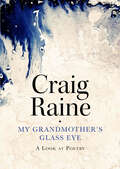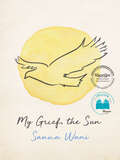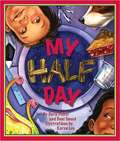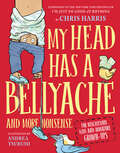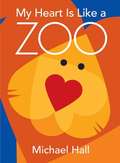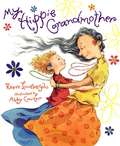- Table View
- List View
My Cat Likes to Hide in Boxes
by Eve SuttonThe cat from France likes to sing and dance. The cat from Norway got stuck in the doorway. But MY cat likes to hide in boxes.
My Childhood in Pieces: A Stand-Up Comedy, a Skokie Elegy
by Edward HirschFrom the award-winning poet, dark comic microbursts of prose deliver a whole childhood, at the hands of an aspiring middle-class Jewish family whose hard-boiled American values and wit were the forge of a poet's coming-of-age.&“My grandparents taught me to write my sins on paper and cast them into the water. . . . They didn&’t expect an entire book,&” Hirsch says in the &“prologue&” to this glorious festival of knife-sharp observations. In microchapters—sometimes only a single scathing sentence long—with titles like &“Call to Breakfast,&” &“Pay Cash,&” &“The Sorrow of Manly Sports,&” and &“Aristotle on Lawrence Avenue,&” Eddie&’s gambling father, Ruby, son of a white metal smelter, schools him and his sister in blackjack; Eddie&’s mom bangs pots to wake the kids to a breakfast of cold cereal; Uncle Bob, in the collection business, is heard threatening people on the phone; and nobody suffers fools. In this household, Eddie learned to jab with his left and cross with his right, never to kid a kidder, and how to sneak out at night. Affectionate, deadpan, and exuberant, steeped in Yiddishkeit and Midwestern practicality, Hirsch&’s laugh-and-cry performance animates a heartbreaking odyssey, from the cradle to the day he leaves home, armed with sorrow and a huge store of poetic wit.
My Dad and the Toot that Shook the World
by Matt CoyneThe perfect Father's Day gift for tooting dads everywhere! All aboard the Butt Force One! Travel the world and back again in this TOOT-ally hilarious rhyming romp following the most destructive fart to ever be farted! When Eddie's dad lets off a ground-shakingly shocking fart, they know it's about to take the world by stinky storm. And only they can stop it . . .Get ready for a toot-acular, rip-roaring, globe-spanning adventure to catch the powerful parp!Perfect for children (and adults) who love a little potty-humour! Written by - but not inspired by - Matt Coyne, bestselling author and creator of the Man vs. Baby blog, with EXPLOSIVE illustrations by Richard Merritt.Praise for Matt Coyne:'A hero for dads everywhere' Daily Mirror'Very, very funny' This Morning'Matt Coyne's post has struck a chord with parents from all over the world' Daily Mail'Brutally honest rant on the reality of parenthood has taken the internet by storm' Sunday Telegraph
My Daddy and I
by P. K. HallinanThis work is for ages 3-5. This is a story that perfectly illustrates the loyalty and love that grows between a father and his children. Whimsical illustrations bring the characters to life in this gentle world Hallinan has created.
My Days: A Memoir
by R. K. Narayan"I am inclined to call this the last chapter, but how can an autobiography have a final chapter? At best, it can only be a penultimate one; nor can it be given a rounded-off conclusion, as is possible in a work of fiction." So begins the last chapter of My Days, the only memoir from R. K. Narayan, hailed as "India's most notable novelist and short-story writer" by the New York Times Book Review.In his usual winning, humorous style, R. K. Narayan shares his life story, beginning in his grandmother's garden in Madras with his ferocious pet peacock. As a young boy with no interest in school, he trains grasshoppers, scouts, and generally takes part in life's excitements. Against the advice of all, especially his commanding headmaster father, the dreaming Narayan takes to writing fiction, and one of his pieces is accepted by Punch magazine (his "first prestige publication"). Soon his life includes bumbling British diplomats, curious movie moguls, evasive Indian officials, eccentric journalists, and "the blind urge" to fall in love. R. K. Narayan's larger-than-life perception of the human comedy is at once acute and forgiving, and always true to it.
My Dinosaur (Literature in Translation Series)
by François Turcot Erín MoureThe figure of the father occupies a particularly significant place in Qu�b�coise literature--there's a real fascination with fathers, and this recurring persona populates fiction, films, and the stories people tell of their families and themselves. Thus, it's not surprising that, as he witnessed his own father's frailty, Fran�ois Turcot--one of Quebec's most celebrated young literary voices--would write his own dedication to his vanished father, entitled My Dinosaur. In this, his first collection of poems to be published in English (and translated by renowned poet Er�n Moure), Turcot excavates, reconstructs, and pays tribute not just to the father, but also to the figure of the son, and to writing itself as key to story, emotion, memory, and history.The dinosaur of My Dinosaur is that of the distant father, sought in mourning, by the son. With luminous and lucid writing, Turcot excavates the fossil gaze of his father, in an elated elegy composed of poems both tensed and open, minimalist and talkative, serious and droll, alternating the voice and writings of the father with the fictions and assemblies of the son--reminding us that a man's story can only be told by assembling the shreds and bits that we've accumulated over the course of our lives. As prolonged metaphor for all disappearances and for the endurance of memory, Turcot's meticulous assembly in My Dinosaur is a tribute to all our Dads. Turcot's surprisingly light and wryly humorous poems will resonate deeply with readers who are inquisitive about the role of family and memory in the construction of identity and self. Scholars who are exploring literary work on grief, and anyone who has lost a parent and felt grief but also curiosity about their lives will connect with Turcot's reflections in My Dinosaur. And finally, fans of the poetics and translation practice of Er�n Moure will delight in this new work that has earned comparisons to Moure's own elegiac work in Kapusta (Anansi, 2015).
My Dog Does My Homework
by Eve Merriam Jack Prelutsky Shel SilversteinEnjoy the book by yourself, with a friend, or maybe--if you’re lucky enough to have one-- with the dog who does your homework.
My Emily Dickinson
by Susan HoweMy Emily Dickinson won The Before Columbus Foundation Book Award. In this book, with exacting rigor and wit, Howe pulls Dickinson free of all the sterile and stuffy belle-of-Amherst cotton wool and shows the poet in touch with elemental forces of nature, and as a prophet in all her radical zealotry and poetic glory.
My Emily Dickinson
by Eliot Weinberger Susan Howe"Starts off as a manifesto but becomes richer and more suggestive as it develops."--The New York Sun With exacting rigor and wit, Howe pulls Dickinson free of all the sterile and stuffy belle-of-Amherst cotton wool and shows the poet in touch with elemental forces of nature, and as a prophet in all her radical zealotry and poetic glory. Her Emily Dickinson is a unique American genius, a demon lover of poetry--no neurasthenic spider artist. Howe draws into her discussion Browning, Wuthering Heights, the Civil War, "Master," the great Puritan preachers, captivity narratives, Shakespeare, and phantom lovers. As she chases away narrow and reductive feminist readings of the poet, Howe finds instead a radically powerful and true feminism at work in Dickinson, focusing the whole on that heart-stopping poem "My Life had stood--a Loaded Gun." A remarkable and passionate poet-on-poet engagement, My Emily Dickinson frees a great poet from the fetters of being read as a special female neurotic, and sets her against a fiery open sky where "Perception of an object means loosing and losing it...only Mutability certain." My Emily Dickinson won The Before Columbus Foundation Book Award.
My Father Was a Toltec
by Ana CastilloMixing the lyrical with the colloquial, the tender with the tough, Ana Castillo has a deserved reputation as one of the country's most powerful and entrancing novelists, but she began her literary career as a poet of uncompromising commitment and passion. My Father Was a Toltec is the sassy and street-wise collection of poems that established and secured Castillo's place in the popular canon. It is included here in its entirety along with the best of her early poems. Ana Castillo's poetry speaks--in English and Spanish--to every reader who has felt the pangs of exile, the uninterrupted joy of love, and the deep despair of love lost.From the Trade Paperback edition.
My Favorite Book
by Good Will IncIn these short, nostalgic, easily understood poems compiled by Good Will Inc. children take pleasure in the simple elements in their lives including birds, grandmothers, gardening, sharing with friends, helping parents, getting up in the morning and going to bed at night. Preschoolers will enjoy having this poetry read to them again and again and will find themselves naturally memorizing their favorites. These poems remind children to pay attention to and be thankful for core values and experiences with family, nature, beauty and friends. Some pictures are described by the validator.]
My Favorite Tyrants
by Joanne Diaz"Winner of the 2014 Brittingham Prize in Poetry, selected by Naomi Shihab Nye" The word "tyrant" carries negative connotations, but in this new collection, Joanne Diaz tries to understand what makes tyranny so compelling, even seductive. These dynamic, funny, often poignant poems investigate the nature of tyranny in all of its forms-political, cultural, familial, and erotic. Poems about Stalin, Lenin, and Castro appear beside poems about deeply personal histories. The result is a powerful exploration of desire, grief, and loss in a world where private relationships are always illuminated and informed by larger, more despotic forces.
My Favorite Warlord
by Eugene GloriaA third collection from an award-winning poet whose "gift is breathtaking" (Naomi Shihab Nye) The themes of identity, relationships, and the poet's sense of origin are at the heart of Eugene Gloria's rich and captivating new collection. The title poem weaves together Japan's sixteenth-century warlord Hideyoshi with a meditation about the poet's father's dementia; "Here on Earth" embraces post-racial America and the speaker's own sense of displacement in the Midwest. In elegy and psalm, as well as ancient forms from Asia such as the haibun and pantoum, these elegant and passionate poems enact rage, civility, love, travel, and art as well as explore Gloria's own fears of frailty and erasure. .
My Feelings: Poems
by Nick FlynnA daring and intimate new book by the poet and memoirist Nick Flynn, "a champion of contemporary American poetry" (Newpages). . . the take from his bank jobs, all of itwill come to me, if I can just get him to draw mea map, if I can find the tree, if I can findthe shovel. And the house, the mansion hegrew up in, soon a lawyer will passa key across a walnut desk, but even thislawyer will not be able to tell me where thismansion is. —from "Kafka" In My Feelings, Nick Flynn makes no claims on anyone else's. These poems inhabit a continually shifting sense of selfhood, in the attempt to contain quicksilver realms of emotional energy—from grief and panic to gratitude and understanding.
My Friends
by Taro GomiVibrant illustrations and a simple, rhythmic text are perfectly blended in this spirited homage to friendship as a little girl recounts all the things she has learned from an enchanting menagerie of animal friends: "I learned to run from my friend the horse. I learned to sing from my friends the birds. I learned to read from my friends the books. And I learned to love from a friend like you."The bold graphic design and brightly colored illustrations that have become the trademark of Taro Gomi's work will appeal to both children and adults.
My Friend's Got This Problem, Mr. Candler
by Mel GlennFourth in a series of photo-illustrated poetry collections, this one centers on the high school guidance counselor and the variety of students and parents he encounters during the week.
My Friends/Mis Amigos
by Taro GomiVibrantes ilustraciones y con un texto simple y rítmico se mezclan perfectamente en este enérgico homenaje a la amistad, como una niña relata todas las cosas que ella ha aprendido de un encantador grupo de animales amigos: "He aprendido a ejecutar desde mi amigo el caballo. Aprendí a cantar de mis amigos las aves. Aprendí a leer de mis amigos los libros. Y aprendí a amar a un amigo como tú."El audaz diseño gráfico e ilustraciones de colores brillantes que se han convertido en la marca del trabajo de Taro Gomi apelará a niños y adultos.
My Grandma Is the Best!
by D.J. SteinbergFrom the best-selling author of the Here I Come! series, this collection of poems makes a perfect gift for grandmas, abuelas, and bubbes everywhere. "A mirror that captures love and reflects it back to its source—a devoted grandmother."—Kirkus ReviewsChildren can celebrate their grandma with this illustrated collection of short poems -- one to a page -- that honors the memories and experiences with the woman they know and love. From playing Doctor with Grandma to sitting on her lap to read a favorite story, this gift book from the best-selling author of the Here I Come! series is perfect for any grandmother.
My Grandmother's Glass Eye: A Look at Poetry
by Craig RaineFrom critic and poet Craig Raine comes a fresh, bold examination of the meaning of poetry and some of the great poetical works of our time"By poetry we—we the masses—mean something vague, something untrue, something uplifting, something beautiful, something so eloquent it isn't for everyday. The word "poetry" is up there with "soul". And I am against it.'Craig Raine's new work of criticism deploys its considerable learning, its intelligent expertise, lightly, wittily, memorably. It is an exercise in demystification and clarity. If you want to know how poetry works on the page, here are sure-footed accounts of particular poems. There is something Johnsonian in Craig Raine's common sense—an elegant wrecking ball used with precision and delicacy to pick off the pretentious, the platitudinous, the over-promoted. Here, poetry is well read, attentively read, by a practitioner whose range runs from Bion to John Lennon, from Bishop to Balanchine.
My Grandpa Is the Best!
by D.J. SteinbergFrom the best-selling author of the Here I Come! series, this collection of poems makes a perfect gift for grandpas, abuelos, and zaydes everywhere.Children can celebrate their grandpa with this illustrated collection of short poems – one to a page – that honors the memories and experiences with the man they know and love. From planting seeds in the garden with Grandpa to reading favorite books together again and again, this gift book from the best-selling author of the Here I Come! series is perfect for any grandfather.
My Grief, the Sun
by Sanna WaniThe highly anticipated debut collection from acclaimed poet Sanna Wani. In Sanna Wani’s poems, each verse is ode and elegy. The body is the page, time is a friend, and every voice, a soul. Sharply political and frequently magical, these often-intimate poems reach for everything from Hayao Miyazaki’s 1997 film Princess Mononoke to German Orientalist scholarship on early Islam. From concrete to confessional, exegesis to erasure, the Missinnihe river in Canada to the Zabarwan mountains in Kashmir, My Grief, the Sun undoes genre, listens carefully to the planet’s breathing, addresses an endless and ineffable you, and promises enough joy and sorrow to keep growing.
My Head Has a Bellyache: And More Nonsense for Mischievous Kids and Immature Grown-Ups (Mischievous Nonsense #2)
by Chris HarrisThis hilarious follow-up to the New York Times bestselling poetry book I'm Just No Good at Rhyming is full of surprising twists of wit and wordplay that will have readers rolling on the floor laughing! <P><P> I'm Just No Good at Rhyming is this century's most acclaimed comedic poetry collection so far, described as "a worthy heir to Silverstein, Seuss, and even Ogden Nash" (Publishers**Weekly), "wildly imaginative...inspired and inspiring" (Kirkus), and as "everything a book for kids should be" (B.J. Novak). Now, Chris Harris delivers all that and more with dazzling new heights of creativity, kooky conundrums, witty wordsmithing, and of course, wacky laugh-out-loud fun! <P><P> There's a whole new cast of characters to meet, from the Nail-Clipping Fairy (who delivers teeth at night), to Orloc the Destroyer (who can be defeated only by his mommy), to the Elderly Caveman (who complains about the younger generation obsessed with playing with fire). There are more mind-bending verbal and visual riddles, plus there's plenty of hilarious hijinks hiding around every corner, whether it's a buffalo that escapes one poem and roams through others or a meteor threatening to land on the book and obliterate everything. There's even a mini book-within-a-book! In between it all, cartoonist Andrea Tsurumi’s diverse range of exuberant people, creatures, and anthropomorphic objects ripple through the pages with playful energy. <P><P> If your head has a bellyache as you read this book, it will only be because you're laughing WAY. TOO. HARD! <P><P><i>Advisory: Bookshare has learned that this book offers only partial accessibility. We have kept it in the collection because it is useful for some of our members. Benetech is actively working on projects to improve accessibility issues such as these.</i>
My Heart Is Like a Zoo
by Michael HallWelcome to the zoo! Twenty animals are waiting for you--some are familiar, some may be brand-new. What are they doing? How are they feeling? Are they friends of yours? Come on in and say hello! Michael Hall's menagerie invites you and your children to talk about feelings and emotions, explore color and shapes, count the hearts, and meet the animals.
My Hippie Grandmother
by Reeve LindberghA young girl describes all the things she likes about her grandmother, including the purple bus she drives, growing vegetables, picketing City Hall, and playing the banjo.

